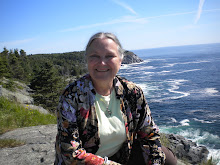The train, the "Empire Builder", was 45 minutes late pulling in at the depot in Whitefish, Montana, where about 50 passengers waited to join its westward run. This is one of the classic American trains, connecting Chicago and Seattle along an efficient and scenic path. The Amtrak station in Whitefish features a statue of the Great Northern Railroad's symbol, a fierce looking muscular Rocky Mountain sheep, recalling the glory days of rail. The cars are large and tall, permitting views of the often spectacular scenery, though the first part of our trip was to be in the gathering dark. The ride was smooth, and the cars were clean. We had sat outside the station, enjoying the soft warmth of the sumer evening, watching the sky turn from red to gold to gray when the headlights of the train came into view up the track.
Quite a few passengers got off in Whitefish, ready to go experience Glacier National Park or wherever in this beautiful northwest corner of Montana. When all of us were seated, it was clear that there were just enough seats left for passengers expected to board in Spokane -- the train was full. I was sitting with a lay minister from Missoula, Montana, on her way to a family wedding, so we had pleasant conversation. Across the aisle, two young men from Russia were settling in for the night. In the next seats ahead of us, an older German couple and their adult son conversed about their day. There were others from places where train travel is more normal than it is in the U.S., and they seemed to be taking the funkiness of American rail travel in stride. And the train seems to have some regular riders who live along its route and want to be connected to other places on it. One family from North Dakota always goes to the coast of Oregon for the month of August, and they always take the train.
I had a good time riding this train, despite the fact that no matter how well I think I sleep on an overnight anything, I always need a nap the day after in a real, flat, bed. In the morning there were fabulous views of the Cascade mountains east and north of Seattle and then of a sun-drenched Puget Sound, with its islands, framed by the Olympic mountains across the way. I don't know when I will have the excuse to do it again, but the arrangement of my family members through the Northwest makes it likely this will not be the only time.
I guess I'm writing to recommend seeking out times to ride the train. This one was a sociable sort of travel, with a chance to exchange friendly chat with random people. There is much more room on a train than on a bus or an airplane. You can walk around. There's the experience of the passing landscape. Although car travel provides advantages of luggage space and passenger comfort, in the cocoon of the car, you meet no one. And I'm thinking that the matter of meeting no one as we travel is a really important loss to us culturally. So when you travel, maybe even if it's not about taking the train, do take a chance on finding ways to meet people along the way.
